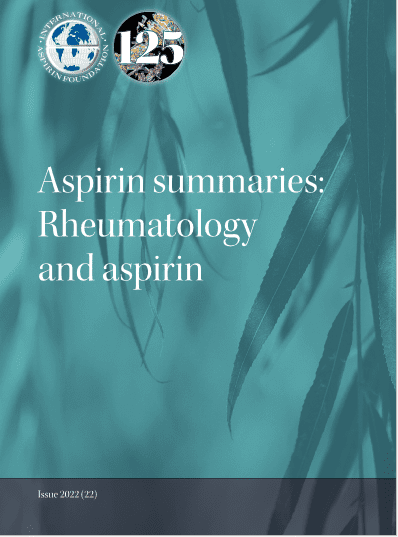Aspirin Summaries : Rheumatology and aspirin
Rheumatoid arthritis (RA) is a common chronic, autoimmune disease in which inflammation and pain impact on first smaller and then larger joints1. It has a worldwide incidence of 0.5-1 % 2. RA can progress to affect skin, eyes, heart, kidneys and lungs 1. Treatment goals are to reduce pain and stop or slow damage to the joints 1. Prostaglandins are key mediators of pain and inflammation in rheumatoid arthritis and aspirin is therefore a useful medicine to help manage this 3,4.
‘Aspirin is an effective anti- inflammatory for RA when used at high doses, due to the inhibition of prostaglandins.’ Rao et al 20221
Further research into the mode of action of aspirin in RA concluded that in addition to its COX inhibition and reduction of prostaglandins it has additional effects on proliferation:
‘aspirin is able to promote apoptosis and inhibit the proliferation of RA-FLS through blocking the JAK/STAT3 and NF-kB signalling pathways.’
Aspirin appears to promote apoptosis and block the cell cycle in a concentration-dependent manner 2. Side effects of high-dose aspirin can however include tinnitus, hearing loss and gastric intolerance 1,4. Rheumatoid arthritis is associated with an increased risk of CV events and mortality and atherosclerosis has a higher prevalence in people with RA than in the general population 5. Both diseases are considered to be inflammatory conditions and share similar risk factors 5. More work is needed to better understand and manage these two conditions and reduce CVD risk for those living with RA.
References
- Rao TJM, Chandira M and Venkateswarlu BS. Rheumatoid arthritis: A overview of current emergent therapies. International Journal of Pharmaceutical Science Invention. 11; 1 Jan 2022 09-14. http://www.ijpsi.org/Papers/Vol11(1)/B11010914.pdf
- Zhang X, Feng H, Minqi Li et al. Aspirin promotes apoptosis and inhibits proliferation by blocking G0/G1 into S phase in rheumatoid arthritis fibroblast-like synoviocytes via downregulation of JAK/STAT3 and NF-kB signalling pathway. Int J Mol Med. 2018. Dec;42(6):3135-3148 https://www.ncbi.nlm.nih.gov/pmc/articles/PMC6202076/
- Rezabakhsh A, Mahmoodpoor A, Soleimanpour H et al. Clinical applications of aspirin as a multi-potent drug beyond cardiovascular implications: A proof of concept for anesthesiologists-A narrative review. Anesth Pain Med. 2021 Oct:11(5):e118909 https://www.ncbi.nlm.nih.gov/pmc/articles/PMC8782056/pdf/aapm-11-5-118909.pdf
- Joshi DC, Harshita, Naskar A et al Rheumatoid arthritis: Etiology pathophysiology and modern treatments. International Journal for Research in Applied Science and Biotechnology. 2022 May; 9(3) https://www.ijrasb.com/index.php/ijrasb/article/view/354/339
- Skeoch S, Bruce IN. Atherosclerosis in rheumatoid arthritis :is it all about inflammation? Nat Rev Rheumatol. 2015 Jul;11(7):390-400. https://pubmed.ncbi.nlm.nih.gov/25825281/
Low-dose aspirin for prophylaxis of cardiovascular events in people with rheumatoid arthritis
Cardiovascular (CV) events are a leading cause of mortality in people with rheumatoid arthritis (RA). Although the disease processes responsible for this are not fully understood the increased incidence of cardiovascular disease (CVD) may result from:
- Chronic systemic inflammation
- Increased traditional CVD risk factors
- Treatment with disease-modifying antirheumatic drugs (DMARDs) corticosteroids and nonsteroidal anti-inflammatory drugs
The authors have previously found that low-dose aspirin and hydroxychloroquine reduce the incidence of CV events in people with systemic lupus erythematosus (SLE) at high risk of atherosclerotic disease. This led them to investigate the role of aspirin for reducing CVD events in RA.
In this Italian, multi centre cohort study, 746 consecutive patients admitted with RA but without a prior CV event, who were assessed at least annually, were selected for investigation. The median follow up period was 5.6 years. CV events were defined as at least one of the following:
- MI
- Angina
- TIA
- Stroke
- Ischemic peripheral artery disease
There was a CV event incidence rate (IR) of 8/1000 person-years in the whole cohort. This was however significantly lower in the group taking low-dose aspirin [IR 1.7/1000 person years] when compared with the group not taking aspirin [IR 11.8/1000 person years] with a p = 0.0002. The study limitations include its observational design and low IR of CV events (lower than reported in other cohorts).
The authors conclude
‘Low-dose ASA may have a role in primary prophylaxis of CV events in RA patients.’
And suggest that further large prospective studies are undertaken.
For further information please see:
Iacono D, Fasano S, Pantano I et al. Low-dose aspirin as primary prophylaxis for cardiovascular events in rheumatoid arthritis. An Italian multicentre retrospective study. Cardiology Research and Practice. 2019 Article ID 2748035. https://www.ncbi.nlm.nih.gov/pmc/articles/PMC6525948/
Safety of aspirin when taken with NSAIDs for rheumatoid or osteo arthritis
This study aims to compare the safety of combining different NSAIDs with low-dose aspirin (less than or equal to 325 mg daily) in people already taking this aspirin dose at baseline. All participants in the study took a proton pump inhibitor (PPI) for gastroprotection. NSAIDs and aspirin both inhibit prostanoid synthesis which have protective effects in certain tissues. It is also thought that nonselective NSAIDS may compete with aspirin, a elective COX-1 inhibitor, for binding on the cyclooxygenase (COX)-1 site which could block its platelet inhibitory action and thus reduce its effectiveness for CVD prevention.
The study examines data from the multicentered, randomised controlled PRECISION (Prospective Randomized Evaluation of Celecoxib Integrated Safety Versus Ibuprofen or Naproxen) trial which evaluated 23,953 patients with osteoarthritis or rheumatoid arthritis who were at increased risk of CVD. The patients were randomised to take either celecoxib (a selective COX-2 inhibitor), ibuprofen (a nonselective COX-2>COX-1 inhibitor) or naproxen ( a nonselective COX-1> COX-2 inhibitor) and this post hoc, sub study analysis used the on-treatment population. Outcomes included:
- Composite major adverse cardiovascular events
- Noncardiovascular death
- Gastrointestinal events
- Renal events
The PRECISION trial demonstrated the noninferiority of moderate-dose celecoxib (100-200 mg twice daily) when compared with naproxen (375 to 500 mg twice daily) and ibuprofen (600-800 mg three times daily). It is interesting to note that when taken without aspirin celecoxib appeared to have a better overall safety profile compared to ibuprofen and naproxen. When aspirin is added to celecoxib this benefit is reduced but there are still fewer gastrointestinal events than in the ibuprofen or naproxen group and fewer renal events than in the ibuprofen group. They also found that among aspirin-users the cardiovascular safety profile of celecoxib is noninferior to that of naproxen or ibuprofen.
The authors conclude
‘Combination with aspirin attenuates the safety advantage of celecoxib, although celecoxib is still associated with fewer GI events than ibuprofen or naproxen and fewer renal events than ibuprofen.’
From a patient care perspective this study demonstrates the favourable overall safety profile of celecoxib when compared with naproxen and ibuprofen and celecoxib is not associated with increased cardiovascular risk regardless of whether the person is taking aspirin or not. They suggest that the interactions between aspirin and NSAIDS regarding safety and efficacy are complex and that further research is needed in order to understand this better and plan pharmacological strategies that maximize analgesic and cardiovascular advantages whilst reducing the potential for harm.
For further information please see:
Reed GW, Abdallah MS, Shao M et al. Effect of aspirin coadministration on the safety of celecoxib, naproxen, or ibuprofen. JACC 2018. 71 (16) :1741-51. https://pubmed.ncbi.nlm.nih.gov/29673465/#:~:text=Adding%20aspirin%20attenuates%20the%20safety,fewer%20 renal%20events%20than%20ibuprofen
The effect of low-dose aspirin on platelet aggregation inhibition in people with rheumatoid arthritis
Coronary artery disease (CAD) may account for 40-50% of deaths in people with RA. Low-dose aspirin is well known for reducing CAD in the general population and levels of serum thromboxane less than 10 ng/ml are seen as a threshold to indicate aspirin’s activity. Levels less than this indicates suboptimal activity. This study aimed to assess the effects of low-dose aspirin on the suppression of platelet aggregation in people with RA to find new ways to reduce CAD risk and mortality for people with RA.
In this study 48 participants with rheumatoid arthritis were given 81 mg/day of aspirin for 10 days. A further 48 healthy controls were given the same low dose aspirin. An enzyme-linked immunosorbent assay (ELISA) was used to measure serum thromboxane B2(sTxB2), a permanent metabolite of thromboxane A2 (TxA2), before and after the treatment with low-dose aspirin. This was compared with healthy control subjects. The researchers found that low-dose aspirin did decrease sTxB2 significantly when compared with baseline in the subjects with RA [p<0.001] and in the healthy controls [p<0.001]. The effect of aspirin was found to be suboptimal in 6.25% of the RA subjects and 2.70% of the controls. A higher erythrocyte sedimentation rate (ESR) level was linked with a suboptimal response in patients with RA. The response to aspirin was also lower in people with a Framingham
Risk Score of 10-20% when compared with those who had a score less than 10%
The authors conclude
“Low-dose aspirin decreased sTxB2 level and suppressed platelet aggregation and therefore, was effective in primary prevention of CV events in patients with RA.’’
Further research with larger numbers of participants and with measures of adherence to therapy was recommended to increase the accuracy of this conclusion.
For further information please see:
Hajialilo M, Ghorbanihaghjo A, Ghassemi F et al. Effect of low-dose aspirin on platelet aggregation inhibition in patients with rheumatoid arthritis. J.Anal Res Clin Medi. 2019, 7(4), 110-7. https://pdfs.semanticscholar.org/5b57/37e5a817d6952a10e189f6af79198a03331d.pdf
Primary care providers’ knowledge around cardiovascular risk in people with rheumatoid arthritis
Rheumatoid arthritis, a systemic auto-inflammatory disease is linked with an increased risk of cardiovascular disease. In order to reduce morbidity and mortality in people with RA early identification and management of cardiovascular risk factors is of critical importance. This study, in the USA, investigated primary care providers’ awareness, management and education around CVD risk in people with RA. They found:
- 71% of clinicians felt continuing medical education about CVD risk and management in people with RA was not adequate
- Only 37% said they felt well prepared for managing CV risk in people with RA
- Only 15% were currently initiating conversations about CV risk with RA patients
The authors raise the fact that a greater awareness of RA as a novel risk factor for CAD is needed, as well as guidance around the importance of helping people to manage this risk. In addition, low-dose aspirin use in this population is not well understood and as a result low-dose aspirin is underutilized.
The author’s state:
“A better understanding of the educational needs and practice patterns of primary care providers may warrant the development of strategies for cardiovascular risk management in patients with RA.”
Further research with larger numbers of participants and with measures of adherence to therapy was recommended to increase the accuracy of this conclusion.
For further information please see:
Pak S. Primary care providers’ awareness, knowledge, and practice with regard to cardiovascular risk in patients with rheumatoid arthritis. Clin Rheumatol 2020. 39,755-760
https://pubmed.ncbi.nlm.nih.gov/31873809/
Can low-dose aspirin during pregnancy prevent adverse pregnancy outcomes in women with arthritis?
The aim of this Italian cohort study, carried out during May 2018 to May 2020, was to investigate the effectiveness of low-dose aspirin (LDA) for preventing adverse pregnancy outcomes (APOs) in women with chronic inflammatory arthritis (IA). The authors note that there was a complete lack of data in this area prior to this study.
The researchers used the Italian P-RHUEM. it register to compared pregnancy outcomes in women with IA who were treated with LDA and those with IA who were not treated with LDA. The register is a nationwide, web-based, longitudinal, observational cohort study which collects data on pregnancies in which the women have an inflammatory rheumatic disease. The register collects the following data at baseline:
- socio-demographics
- obstetric history
- comorbidities
- clinical and laboratory characteristics
And during pregnancy each trimester collects information on:
- maternal disease
- medications
- foetal development
- pregnancy complications
During the study period 45 women with IA had known outcomes for a completed pregnancy. These women had the following conditions:
- 20 rheumatoid arthritis
- 10 psoriatic arthritis
- 6 ankylosing spondylitis
- 5 juvenile idiopathic arthritis
- 4 undifferentiated arthritis
LDA was used in 13 (28.89% of these women and was used more often in women with a previous APO, anti-phospholipid positivity and biological DMARD treatment. All LDA-treated women had live births (100%) compared to the non LDA group where the live birth rate was 84.4% with 27 live-birth pregnancies, 3 early miscarriages, 1 foetal loss and 1 stillbirth recorded. Despite the lack of a statistically significant difference in the LDA and non LDA treated groups with pregnancy/peripartum obstetric complications [p=0.14] the investigators observed that less APO were registered in the women who took LDA.
The authors conclude:
“The preliminary data of this prospective cohort study show that LDA improve pregnancy outcomes in IA even if women treated with LDA had more risk factor for APO.”
The researchers hope to extend this cohort to further investigate these findings.
For further information please see:
Lini D, Gerardi MC, Zanetti A et al. POS0476 Can low- dose aspirin during pregnancy prevent the development of adverse pregnancy outcomes in women with arthritis? Data from the P-RHEUM.ITStudy. Annals of the Rheumatic Diseases 2021;80:470 https://ard.bmj.com/content/80/Suppl_1/470.1












